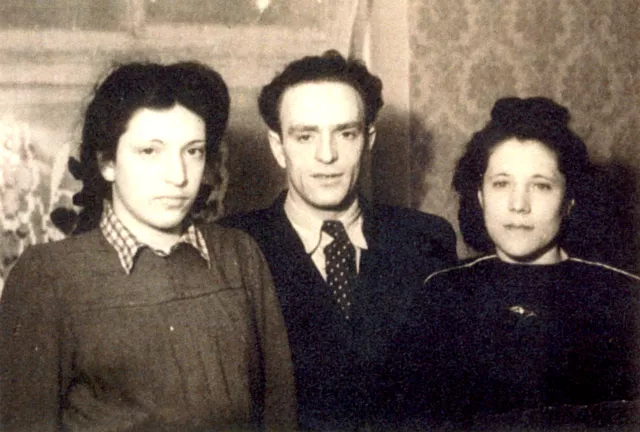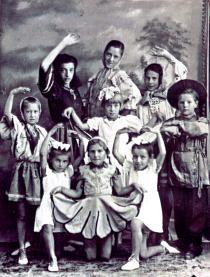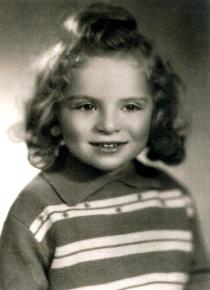From left to right: me, my older brother Todres Zaks and his wife Sima. We were photographed at my brother's home. This photo was taken in Riga in 1948.
In 1941 Todres volunteered to the front on the first day of the war. He was at the front during the war. The commander of his regiment heard that he could speak German and my brother became an interpreter at the headquarters.
Todres changed dramatically after the war. I remember how kind and caring he had been before the war, but the war made him cruel. After the war he went to work as a leather worker. Leather workers earned well. Todres was young and wanted a good life. My brother and I were a burden to him. He had a family and had to take care of it. He was married to Uncle Boris wife's sister for six months. Something went wrong and they divorced. Todres married Sima Taiz, a very beautiful Jewish girl from Riga. They had a traditional Jewish wedding. In 1949 their son Isaac, named after our father, and in 1959 their daughter Bella were born. The first letter of her name repeated the first letter of our mother Buna's name. Todres believed that it was his duty to take care of his family, and we were mature enough to take care of ourselves. Perhaps, he had some reason?
In 1947 after finishing the 7th grade I came of age to leave the boarding school. I moved to Riga. I stayed with my uncle for six months. I became an apprentice at the sewing factory in Riga. I also went to the 8th grade of an evening school. When my uncle's daughter was born, I helped his wife to look after the baby. However, I could not stay with my uncle any longer. There were five of us living in two small rooms, and when the baby was born, there was no space for a baby bed. I rented a bed from a family. I didn't stay long with those families. When their situation changed, I had to look for another bed. I was pressed for money. Apprentices received 30 rubles of allowance. I paid 15 rubles per month for the bed, and it was difficult to make a living on 15 rubles, particularly after the war, when there was lack of food. When I started working, I didn't earn much either. I was just a beginner, and was paid based on a piece-rate basis. Life was hard, but I knew I could only rely on myself. I joined the Komsomol at the factory. I was an active Komsomol member and participated in all events. After finishing the 8th grade I couldn't afford to continue my studies. I had to earn my living. There were many Jewish, Latvian and Russian employees at the factory, but there was no anti-Semitism.
Ida Goldshmidt with her brother Todres Zaks and his wife Sima
The Centropa Collection at USHMM
The Centropa archive has been acquired by the United States Holocaust Memorial Museum in Washington, DC.
USHMM will soon offer a Special Collections page for Centropa.
Academics please note: USHMM can provide you with original language word-for-word transcripts and high resolution photographs. All publications should be credited: "From the Centropa Collection at the United States Memorial Museum in Washington, DC". Please contact collection [at] centropa.org.















